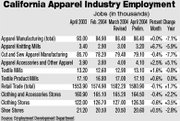Outlook Brightens, Particularly for Retail, in Q2
The second quarter of 2004 showed continued signs of recovery for the general California economy while the textile industry saw slight gains and the apparel industry benefited from steady retail sales.
Employment for apparel manufacturers and textile mills remains low, but the retail side of the equation is picking up with apparel and accessories retailers either maintaining current employment levels or adding new employees statewide.
Apparel manufacturing employment statewide held steady in April at 86,400 jobs, but that figure represented a 7.1 percent decline from last year. Textile mills saw a 1.6 percent increase in jobs between March and April 2004, but year to year, the sector is still struggling. Employment at textile mills dropped 0.8 percent between April 2003 and April 2004 to 13,100 jobs.
The lost apparel jobs are not likely to be replaced unless consumers and retailers increase demand for domestic-made goods, said Jack Kyser, chief economist at the Los Angeles County Economic Development Corp.
“We could get some flow-back of jobs if retailers move to more of a quick-turn situation,” Kyser said. “What we do best is quickturn high fashion—let’s hope that grows.”
Kyser noted competition is set to increase next year, when quotas will be eliminated for many imported goods, particularly those made in China. The competitive situation could be compounded further if lawmakers pass the Central American Free-Trade Agreement, which would open up additional opportunities in this hemisphere.
The bright note is retail, where clothing and accessories stores saw employment pick up by 2.2 percent in the last year to 164,500 jobs statewide as of April.
“A lot of people are still expanding,” Kyser said. “Retail is still considered one of the hottest sectors. Even in the Bay Area, retail numbers are looking good.”
There are still some areas of concern for consumers, Kyser noted, including the ongoing war in Iraq, rising gasoline prices and the likelihood that the Federal Reserve will raise interest rates this summer. But he said it is unlikely that these consumer concerns will affect apparel sales. Rising gas prices, he said, will probably have more of an impact on consumers’ car buying. And although interest rates will probably increase in June, Kyser said the Fed is likely to be cautious about any adjustments.
“This is America. When the going gets tough, the tough go shopping,” he noted. —Alison A. Nieder






















